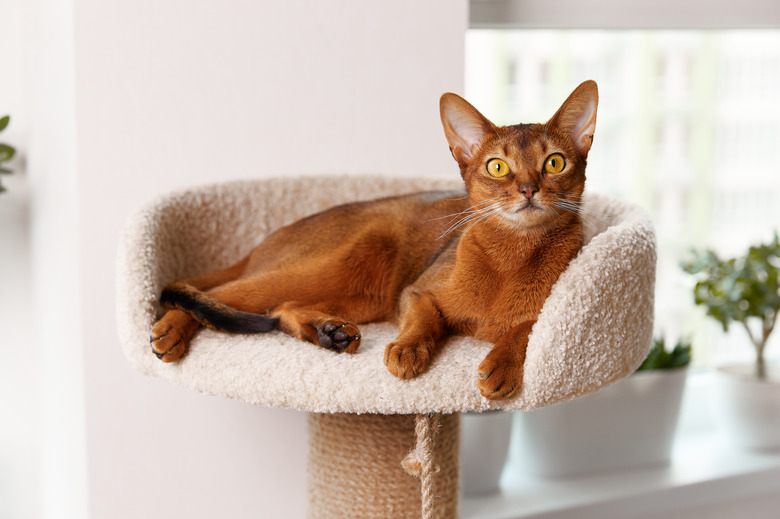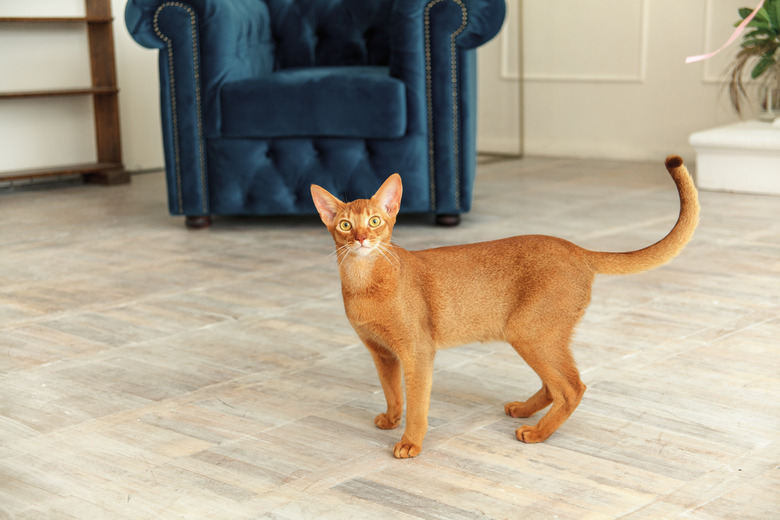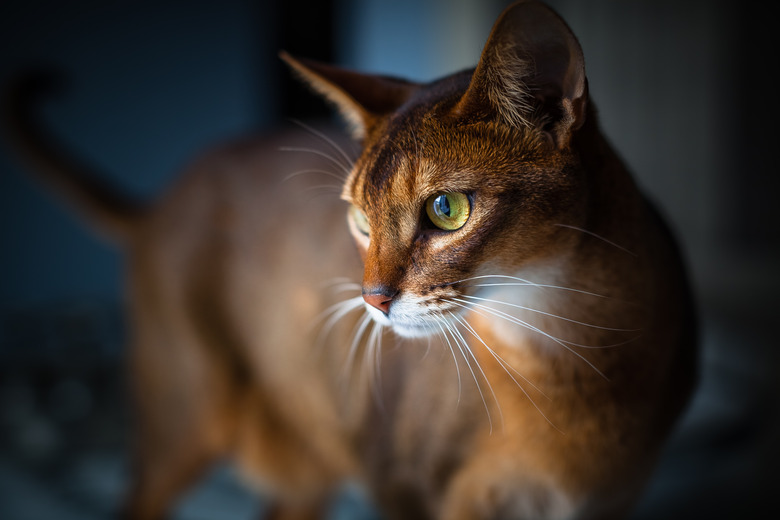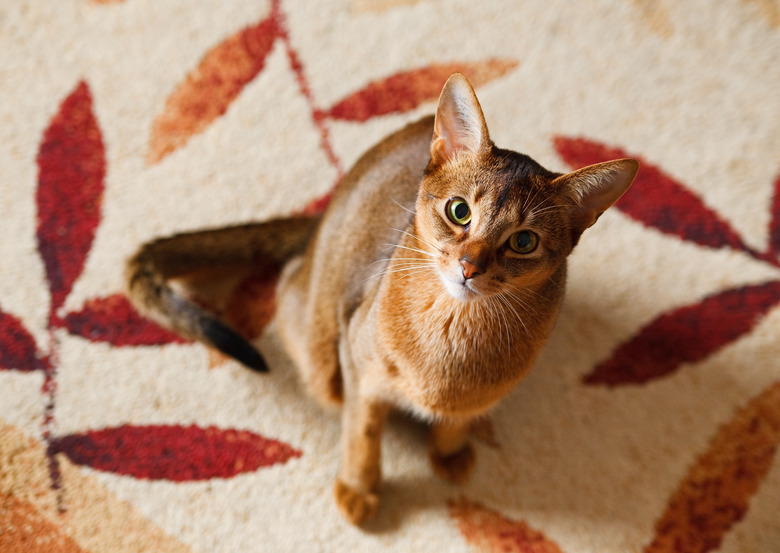Abyssinian Cat Breed Characteristics
Abyssinian quick facts
Abyssinian quick facts
Length: 12 – 16 inches
Weight: Females: 6 – 9 pounds, males: 7 – 12 pounds
Lifespan: 14 – 17 years or more
Coat length: short
Coloring: Black-silver, chocolate, chocolate-silver, cinnamon, cinnamon-silver, diluted blue, diluted blue-silver, fawn, fawn-silver, lilac, lilac-silver, and ruddy
Grooming needs: low
Friendliness: Breed alone is not an accurate predictor of individual cats' personalities. However, Abyssinian cats are generally regarded as affectionate, energetic, intelligent, and loyal.
Abyssinian cat breed, also called Aby, may not be the most popular cat breed but is a wonderful breed to consider for your next cat. They may be domestic cats, but the breed looks like a wildcat. Abyssinians are medium-sized cats. The males are larger and tend to be less active than the females. They come in a variety of coat colors and have a striking ticked coat, large ears, and almond-shaped eyes.
Abyssinian cat history
Abyssinian cat history
The Abyssinian is an ancient cat breed and much of its history is unknown. The breed closely resembles the cats represented in ancient Egyptian artifacts, but many doubt that the breed originated in Egypt. Another theory is that the cats originated in Abyssinia, a region that is currently recognized as Ethiopia. After the Abyssinian war in 1868, British soldiers were thought to have taken an Abyssinian cat named Zula back to England with them.
As genetic studies have advanced, more is known about the potential origins of the breed. Genetic testing does not show that Zula was an ancestor of the Abyssinian breed. Instead, they may have originated in parts of Southeast Asia and the coast of the Indian ocean. A taxidermal exhibit at the Leiden Zoological Museum in Holland features one of the earliest known cats of the breed that was purchased sometime between 1834 and 1836.
Regardless of their ancient origins, the breed was further developed in Britain and in the early 1900s was brought to the United States. The Abyssinian cat breed is recognized at cat shows by both the Cat Fancier's Association (CFA) and the International Cat Association (TICA).
Abyssinian cat personality
Abyssinian cat personality
The breed is athletic, lithe, and agile. If you are looking for a lap cat, the Aby is not for you. However, if you are interested in a playful, curious cat who loves your company and is extremely loyal, the Aby may be a perfect match.
They prefer to spend time on high perches, so make sure to equip your home with tall cat trees, shelves, and bookcases that give your cat a high place to explore and observe. These cats are extremely intelligent. Make sure to keep them entertained and engaged with regular playtime and plenty of toys and elevated perches.
Abyssinian cat lifespan and health issues
Abyssinian cat lifespan and health issues
The Abyssinian tend to be healthy and long-lived with an average lifespan of 14 to 17 years. Some cats have even lived into their 20s. The cat breed does have some health issues that they are more prone to compared to other cats.
Be sure to discuss the health and test results of your new cat with the breeder. Reputable breeders avoid breeding cats with known genetic health issues and conduct genetic testing to make sure cats and kittens aren't predisposed to common conditions. Two conditions that breeders can test for include pyruvate kinase deficiency, a type of anemia caused by the abnormal death of red blood cells, and progressive retinal atrophy, a condition that leads to blindness.
Renal amyloidosis is another condition these cats are prone to but unfortunately, genetic testing is not available. This condition causes a waxy substance called amyloid that is made primarily of proteins to accumulate in kidney cells and, in some cases, other organs. Another health problem Abyssinian cats are prone to is patellar luxation, a condition that causes the cat's kneecap to slide out of position. A veterinarian can check for this problem with a physical exam.
Abyssinian cat grooming and care
Abyssinian cat grooming and care
These short-haired cats are low maintenance when it comes to grooming. Dead skin and hair can accumulate on their coat, so brush your cat on occasion and wipe their coat with a damp cloth. These cats also benefit from bathing as needed. It is best to start this practice with your new Abyssinian kitten so that they are used to the water. These cats tend to enjoy physical contact and handling, so if you start slowly and patiently, grooming should be an enjoyable experience rather than a chore.
Make sure to brush your cat's teeth regularly to prevent periodontal disease. Use toothpaste formulated for cats. Check and trim your cat's nails every other week. Feed high-quality, commercial cat food as directed by your veterinarian, and make sure your cat has unlimited access to fresh water.
Welcoming a new cat into your home
Welcoming a new cat into your home
Prep your home before bringing a new Abyssinian cat or kitten into your home. Make sure to set up a litter box, food and water dishes, cat trees, and toys. Make sure the room is safe for your new cat and free of any crevices where they may get stuck or injured. Put away electrical cords and any houseplants that aren't safe for cats.
Consider the breed's personality and care requirements before committing to bringing a new Abyssinian kitten into your home. Be patient when your cat arrives as many cats tend to take some time to become comfortable in a new location. Allow them space to relax and explore and allow them to come to you.
Don't force them to be petted or put into rooms and situations where they aren't yet comfortable. Never punish your cat when they test your boundaries. Instead, use positive reinforcement. This is not only more effective, but it also helps to build a stronger relationship with your cat.
Fortunately, the Abyssinian cat breed is known for being inquisitive and loving people. So with some love and patience, your new cat is sure to be an active part of the family in no time.



